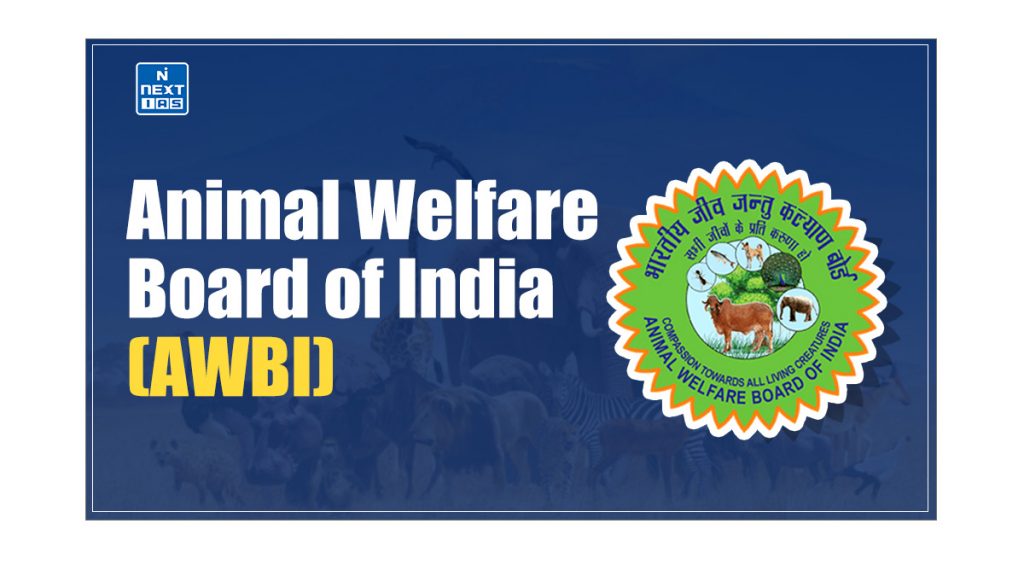
The Animal Welfare Board of India (AWBI) plays a crucial role in safeguarding the rights of animals in India. By working to ensure that animals are treated with respect and compassion, it seeks to foster a more humane society. This article aims to provide a comprehensive overview of the Animal Welfare Board of India (AWBI), including its establishment, needs, functions, effectiveness and other related aspects.
About Animal Welfare Board of India (AWBI)
- The Animal Welfare Board of India (AWBI) is a statutory advisory body established in 1962 in accordance with Section 4 of the Prevention of Cruelty to Animals Act, 1960.
- A well-known humanitarian, late smt. Rukmini Devi Arundale, was instrumental in the formation of AWBI and acted as its first Chairperson.
- The Board has been monitoring animal welfare laws of the nation, providing grants to Animal Welfare Organizations (AWOs) and advises the Government on animal welfare issues for the last 55 years.
- The AWBI comes under the Union Ministry of Environment, Forests and Climate Change (MoEFCC).
- The Board of AWBI consists of 28 Members.
- The term of office for members is three years.
- It is headquartered in Ballabgarh, Haryana.
Establishment of Animal Welfare Board of India
- India has several religious traditions which involve non-violence and cruelty towards animals.
- Also, being one of the world’s leading producers of animal products, India needed an institution that caters exclusively towards animal and their welfare.
- Consequently, the Government of India established the Animal Welfare Board of India under the provisions of the Prevention of Cruelty to Animals Act, 1960.
Functions of Animal Welfare Board of India
The major functions of AWBI can be seen as follows:
- It monitors the law for the Prevention of Cruelty to Animals and works for the improvement of the condition of animals by encouraging or providing for the construction of water troughs, sheds, etc, and by providing veterinary assistance to animals.
- It advises the Central Government on making rules to prevent unnecessary pain or suffering to animals, especially when they are being transported from one place to another or used as performing animals or are kept in captivity or confinement.
- It provides financial assistance towards the establishment of Pinjrapole, rescue homes, animal shelters and sanctuaries where animals and birds may find shelter in times of need.
- The Board grants recognition to the newly started Animal Welfare Organizations (AWOs) and coordinates the work with various bodies established for the purpose of animal welfare and their protection.
- It imparts education in relation to the humane treatment of animals.
Effectiveness of Animal Welfare Board of India (AWBI)
- Animal abuse seems to have peaked, and mindless cruelties are suffered by animals.
- The old act allows offenders to get away with very nominal fines, thus undermining the value of the offence.
- The Board must strive towards amending the act with the new Animal Welfare Bill, 2014 that has provisions of adequate punishment for animal cruelty.
- Animal Welfare Board had also raised its voice against the notification of the Ministry of Environment, declaring monkeys, nilgais, and wild boar as vermin for one year in Himachal Pradesh, Uttarakhand and Bihar.
- It has also termed this as an arbitrary decision.
Challenges Faced by Animal Welfare Board of India
- Enforcement Issues: The enforcement of animal welfare laws can be challenging due to inadequate infrastructure, lack of awareness, and limited resources.
- Public Awareness: Public awareness and education on animal welfare issues is inadequate. This makes it tougher to foster a culture of compassion and responsibility.
- Resource Constraints: The Board faces constraints in terms of funding and manpower, which impact its ability to carry out its functions effectively.
Conclusion
The Animal Welfare Board of India (AWBI) is a vital institution in the country’s efforts to promote and protect animal welfare. Through its regulatory functions, educational initiatives, and support for animal welfare organisations, it plays a key role in advancing humane treatment and ensuring that animals receive the protection and care they deserve. Continued support for the Board’s initiatives and addressing the challenges it faces are essential for enhancing animal welfare in India and fostering a more compassionate society.
Key Facts About Animal Welfare Board of India (AWBI)
- The Board was initially within the jurisdiction of the Union Ministry of Food and Agriculture.
- However, later in 1990, the subject of Prevention of Cruelty to Animals was transferred to the Union Ministry of Environment.
- Accordingly, it was transferred under the jurisdiction of the Ministry of Environment and Forests.
- In its 55-year history, the organisation has always been chaired by people who were not a part of the government, such as veterinarians, animal welfare activists, or retired judges.
- However, since March 2017, it has been headed by a senior Government official.
Frequently Asked Questions (FAQs)
Which ministry is the Animal Welfare Board of India under?
The Board works under the jurisdiction of the Union Ministry of Environment, Forests and Climate Change.
Is Animal Welfare Board of India statutory body?
Yes, it is a statutory advisory body established under the Prevention of Cruelty to Animals Act, 1960.





